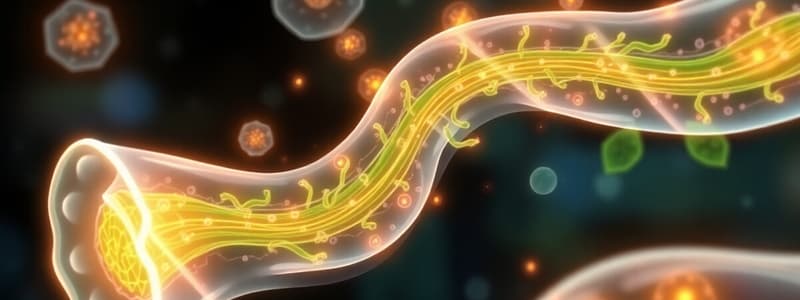Podcast
Questions and Answers
What is the primary purpose of phloem in plants?
What is the primary purpose of phloem in plants?
- Facilitating photosynthesis
- Transporting sucrose and amino acids (correct)
- Absorbing nitrogen compounds
- Transporting water and mineral ions
Which of the following factors does NOT affect the rate of transpiration in plants?
Which of the following factors does NOT affect the rate of transpiration in plants?
- Humidity
- Wind speed
- Light intensity
- Soil composition (correct)
How do root hair cells primarily absorb water?
How do root hair cells primarily absorb water?
- Via osmosis from the soil (correct)
- By diffusion of carbon dioxide
- Through capillary action in the roots
- Through active transport of minerals
What is transpiration in plants?
What is transpiration in plants?
Why do multicellular organisms require a transport system unlike unicellular organisms?
Why do multicellular organisms require a transport system unlike unicellular organisms?
Flashcards
Why do simple organisms rely on diffusion?
Why do simple organisms rely on diffusion?
Diffusion is the movement of particles from a region of higher concentration to a region of lower concentration. Simple, unicellular organisms rely on diffusion because their surface area to volume ratio is high, meaning that substances have a short distance to travel to reach all parts of the cell.
Why do multicellular organisms need a transport system?
Why do multicellular organisms need a transport system?
Multicellular organisms, with their large size and complex structure, require a transport system to move substances efficiently around the body. This is because diffusion alone is not fast enough to deliver nutrients and remove waste products from all cells.
What is the role of phloem?
What is the role of phloem?
Phloem transports dissolved sugars (mainly sucrose) and amino acids from the leaves, where they are produced during photosynthesis, to other parts of the plant where they are needed for growth, storage, or respiration.
What is the role of xylem?
What is the role of xylem?
Signup and view all the flashcards
How is water absorbed by root hair cells?
How is water absorbed by root hair cells?
Signup and view all the flashcards
Study Notes
Diffusion in Unicellular Organisms
- Unicellular organisms, being small, rely on diffusion for the movement of substances into and out of the cell.
- Diffusion is sufficient because the distance substances need to travel is short.
Transport Systems in Multicellular Organisms
- Multicellular organisms require transport systems to efficiently move substances throughout their bodies.
- Diffusion over long distances is too slow and inefficient.
Phloem Transport
- Phloem transports sucrose and amino acids between the leaves (where they are made) and other parts of the plant (where they are needed).
- Phloem transports these materials through translocation.
Xylem Transport
- Xylem transports water and mineral ions from the roots to the rest of the plant.
- This upward movement is called the transpiration stream.
Water Absorption by Root Hair Cells
- Root hair cells increase the surface area for water absorption from the soil.
- Water moves into the root hair cells by osmosis.
Transpiration
- Transpiration is the evaporation of water from a plant's surface, primarily from leaves.
- This process drives the movement of water and minerals up the plant.
Factors Affecting Transpiration Rate
- Humidity: High humidity slows transpiration due to less of a difference between the air and leaf surface moisture.
- Wind speed: Higher wind speed increases transpiration as it removes water vapor from around the leaf.
- Temperature: Higher temperatures increase transpiration due to faster evaporation rates.
- Light intensity: Higher light intensity usually increases transpiration as plants undergo photosynthesis, opening stomata more.
Environmental Factors and Transpiration Rate Investigations
- Environmental factors (humidity, wind, temperature, light) influence the rate of transpiration from a leafy shoot.
- Investigations can measure changes in these variables to determine transpiration rates.
Studying That Suits You
Use AI to generate personalized quizzes and flashcards to suit your learning preferences.




